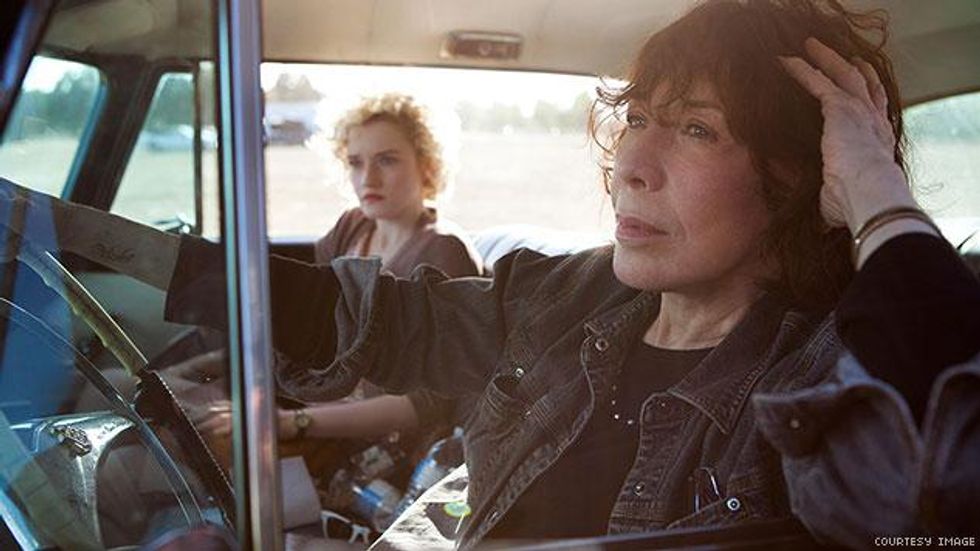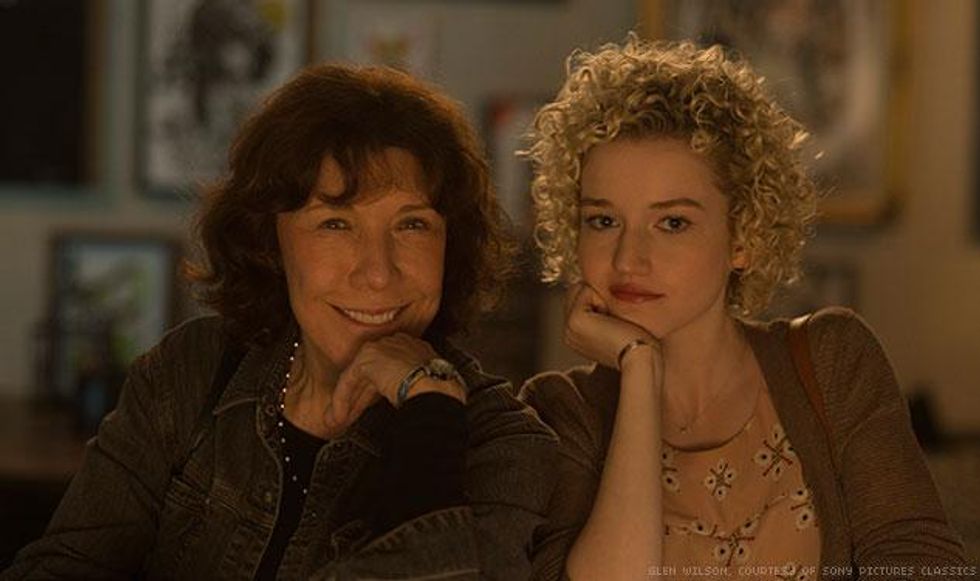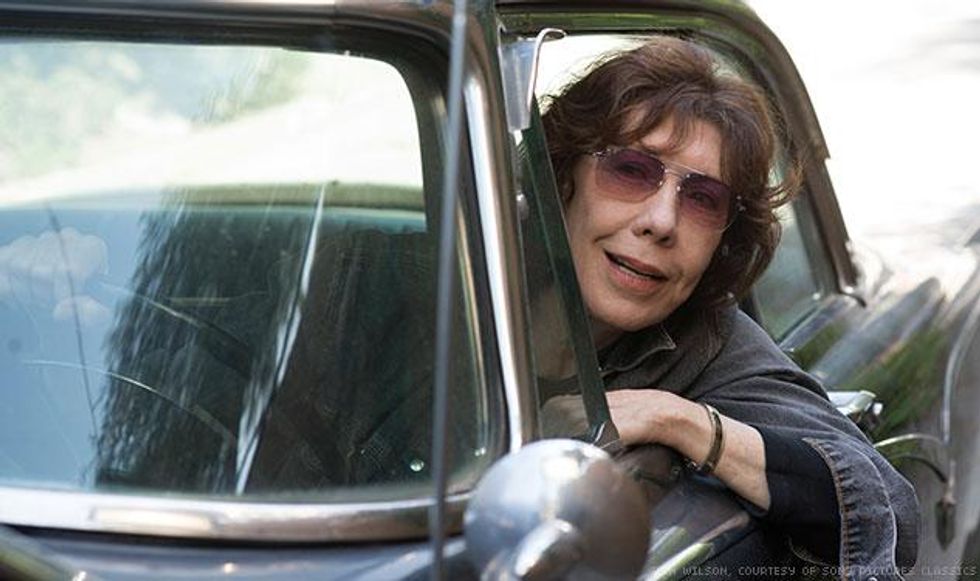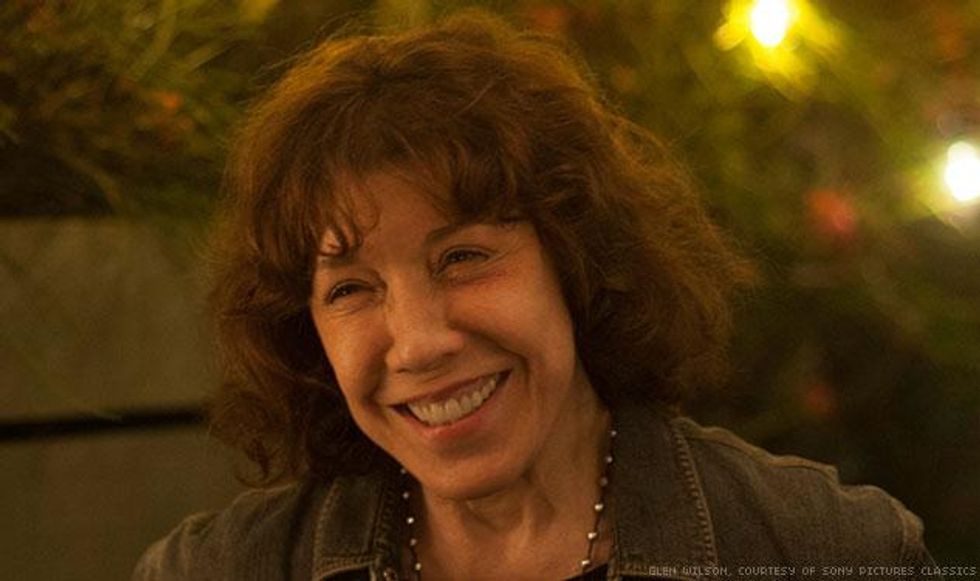
The out comedy legend opens up about her acclaimed film Grandma, tears up over LGBT progress, and explains why it's important to never call Bette Midler a douche bag.
August 26 2015 5:00 AM EST
By continuing to use our site, you agree to our Privacy Policy and Terms of Use.

The out comedy legend opens up about her acclaimed film Grandma, tears up over LGBT progress, and explains why it's important to never call Bette Midler a douche bag.

Tomlin has also earned glowing reviews and Oscar buzz for her starring role as a misanthropic lesbian in the new film Grandma, which recently opened in New York and L.A. and opens Friday in San Francisco. In 2013, Tomlin married Jane Wagner, her partner and collaborator of (now) 44 years, because she could.
Grandma writer-director Paul Weitz (About a Boy, In Good Company) created the role specifically for Tomlin after working with her on his 2013 film Admission. Tomlin plays a feminist poet still grieving for her partner of 38 years when her 18-year-old pregnant granddaughter (Julia Garner) shows up needing $600 before sundown. This triggers a day-long road trip that allows them both to come to terms with their past and future.
"I wrote it for her and in many ways she wrote it for me," Weitz says. "Lily has had this marvelous relationship with Jane Wagner, and I thought if the person passed away after 38 years, how would someone move on from that kind of loss?"
With so few films about same-sex parents, Weitz had no qualms about depicting a family that's fairly dysfunctional (Marcia Gay Harden plays Tomlin's bitter daughter) or concerns about a homophobic audience saying, "See what happens?"
"They're all there for each other," he says. "No matter what problems they have, at their roots, these people love each other -- and that was really important to me. And to hell with anyone who thinks that a realistic depiction of people who love each other is somehow a sign of the apocalypse."
For someone who's been a huge fan of Tomlin's since she first created characters such as Ernestine the telephone operator and 5-year-old Edith Ann on TV's Laugh-In -- and delighted in her film roles, including Nashville, 9 to 5, All of Me, Big Business, and A Prairie Home Companion -- it was an honor to sit down and realize that (as Ernestine would say) Lily Tomlin is "the party to whom I am speaking."

Lily Tomlin: Of course we wanted to serve the film and the issue. That's what's so marvelous -- that so many points of view are expressed and covered. They're not the focus of the movie, but they permeate it.
What were some of the most gratifying things for you about the role?
Just how it flowed, how easy it was. Once the day came to start, we started and we didn't stop. And it was done, and we never had a problem.
Were there any moments or scenes that were challenging?
Only my hair. My hair is always a challenge.
You played a lesbian in the film Tea With Mussolini, but in Grandma you're the central character. Did you feel any responsibility playing a gay character when we don't see many in major motion pictures?
I always feel responsible for the person I'm going to play on the screen. I felt that this was true and authentic and I was comfortable with that. I didn't have any real issue. I wouldn't have been able to start the movie if I had. I felt that Paul understood the character and knew what he was doing.
In 1969 you became an overnight star on Laugh-In the same year as the Stonewall riots and the beginning of the gay liberation movement. You've always supported gay projects such as appearing in And the Band Played On and narrating The Celluloid Closet. But what's it been like to see the changes in LGBT equality and in media depictions of gay characters from then until now?
The last 10 to 15 years it's been sort of stunning. This generation has been out of this world. I want to say it's because of everyone who came before them who did whatever they tried to do. They may not realize it, but they've been the beneficiaries of that activism, like my friend [activist-writer] Vito Russo and what he endured, and he's not really here to see it.
And how extraordinary -- [she begins to tear up and takes a moment to recover] -- I'm sorry ... when I think of what my own gay brother went through as a young kid. He's three years younger than me, and he lives in Nashville now, so he's not absolutely out of the fire. But it's just been galvanizing to see the difference.
Have there been specific things you've noticed within the last 10 or so years that have made you think, Wow. I never thought I would see this.
I didn't think I'd see marriage. And I didn't think we'd even see the good gay characters that have been portrayed in sitcoms. I think of Sean Hayes on Will & Grace, and of course Ellen DeGeneres, who came out in 1997. She fell out of favor immediately after that and paid a price for it. Then when she did Finding Nemo [in 2003] she sort of resurfaced.
And now she's the darling of every housewife in America.
Absolutely! I was asked in the press who's the most important gay person of the last decade and I said, "Ellen, because she came into everyone's home and she was this likable, adorable, funny person who just took over."
Speaking of marriage, congratulations on yours. Why, after 42 years together, did you decide to do it?
It was just kind of like 'cause we could. So many people asked me, "When are you and Jane gonna get married?" so I finally said, "We're thinking about it." Once I opened that door it was like a barrage of "When are you and Jane gonna get married?" So we did. And we're glad we did.

That was the best part. Having Jane Fonda, Kate McKinnon, Reba McEntire, and Jane Lynch -- such a funny quadruple group of people -- and Jane Lynch saying she used to do my routines when she was a kid.
Who were some of the female performers who inspired you while you were growing up?
Only your seasoned readers will know them, but I was inspired by the old television stars -- Gracie Allen, Imogene Coca, Gale Storm, Ann Sothern, Jean Carroll, who was a stand-up ... Lucy!
Congratulations on the success of Grace and Frankie. What's it been like to work with Jane Fonda now as opposed to when you did 9 to 5 together 35 years ago?
It's not a lot different. She's just as fun as she always was. She's interested in every aspect of the production. She watches all the dailies, and I have no time to watch the dailies, so I always ask her, "Did we fail any scene?" And she says, "No." She's just great.
As executive producers, the two of you have input on the scripts, so what are some of the things you've encouraged them to include?
We want the older women to be as real as possible in a half-hour television show, and we want them to deal with "women of a certain age" issues. And it creeps in, like us being ignored when we're trying to buy cigarettes.
That was my favorite scene in the whole season. And then you steal them.
"If they can't see you, they can't stop you." We like all that. And we like dealing with the husbands. They're more active in the second season.
Dolly Parton has said that she'd love to appear on the show.
We adore Dolly and we'd love to have her on the show. Everyone's of the mind that we've got to establish Grace and Frankie before we bring anyone in like Dolly, because then it's so emphatically about 9 to 5. So we don't have anything planned right now.

Laugh-In: Our producer Carolyn Raskin used to stand in the bleachers with the script on a podium and it was just voluminous because there'd be one blackout joke to a page and she'd have to keep track of them. She had page after page of notations -- and Henry Gibson set fire to it one day. I don't know how she ever fixed that up.
9 to 5: I like all the times when we'd call each other by our real names by mistake. Like when I'm pushing the body out of the hospital, Dolly said, "There goes Lily now!" And we'd have to start over.
Big Business: I had a big falling-out with the producers because they had the gay characters calling Bette Midler's character a "douche bag." I said, "You cannot have the gays calling her a douche bag, it makes them seem like woman haters. Just because the rest of you assholes call a woman a douche bag!" I was just emphatic about it and Bette said, "Lil, lighten up." I said, "How would you feel if Sophie goes to see this movie in 15 years and she hears these guys calling their mother a douche bag?"
A Prairie Home Companion: Working with Meryl Streep was so exciting. When I got the part, everyone was saying, "What is it going to be like to work with Meryl Streep?" My own mother was saying that to me.
When I did promotion for the film, we had a moderator on stage and she said, "What was it like to work with Meryl Streep?" I said, "Frankly, she was not my first choice." Everyone in the theater just cracked up, except two young girls sitting in the front, and one of them said, "Well that wasn't very nice."
Even for a brilliant comedian like Lily Tomlin, there will always be someone who just doesn't get the joke.
For more information on Grandma visit the film's website.
Charlie Kirk DID say stoning gay people was the 'perfect law' — and these other heinous quotes